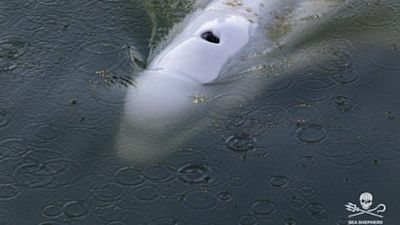Weakened whale trapped in River Seine still refusing food in 'race against clock'

A dangerously thin whale stranded in France's River Seine is still refusing to eat, despite it receiving appetite-stimulating drugs.
French environmentalists have described their efforts to feed the beluga whale, which was first spotted in the Seine last week, as “a race against the clock”.
It has so far refused catches of fish. Lamya Essemlali, president of marine conservation group Sea Shepherd France said: “It is really extremely thin. Its bones are protruding. I don’t know if it’s already too late.”
Far from its Arctic habitat, the whale is still rejecting food despite receiving "appetite stimulators", Sea Shepherd France said.
In an update posted to social media on Monday, Sea Shepherd France wrote: "The beluga is still not feeding... but it continues to be curious.
"At round 4am he rubbed himself for 30 minutes on the walls of the lock and got rid of the stains that had appeared on his back. Antibiotics may also have helped."
In ocean waters, belugas eat an array of fish as well as octopus, squid, crabs, shrimp and other animals. But the fresh water Seine can’t sustain the trapped whale's dietary needs.
Want a quick and expert briefing on the biggest news stories? Listen to our latest podcasts to find out What You Need To Know
The environmentalists have stayed up overnight with the beluga in an attempt to feed him, with no success.
They are hoping to spare the whale the fate of another, an Orca, also known as a killer whale, that strayed and then died in the Seine in May.
In the UK, a baby whale was put to sleep last year after efforts to guide it out of the Thames failed.
The Beluga in France will not yet be euthanised as, though very thin, it is "alert" and "dynamic", Sea Shepherd France said.
The creature was filmed by authorities gently meandering in a stretch of the Seine's light green waters between Paris and the Normandy city of Rouen, many dozens of kilometres inland from the sea.
Drone footage captured the whale swimming between Paris and Rouen
Authorities in the l’Eure region said in a Friday night statement that the wild animal has a “fleeing behavior vis-a-vis the boats” and has not responded to attempts to guide it to safer waters.
Sea Shepherd France is pushing for the creature to be captured, rather than coaxed down the river toward the sea. The organisation said it should be repatriated by plane to the Arctic waters it likely came from.
Ms Essemlali said DNA testing could determine whether it came from waters around Norway, Canada or Russia.
“It’s logistically difficult but is is doable,” she said. “It will be a matter of will.”